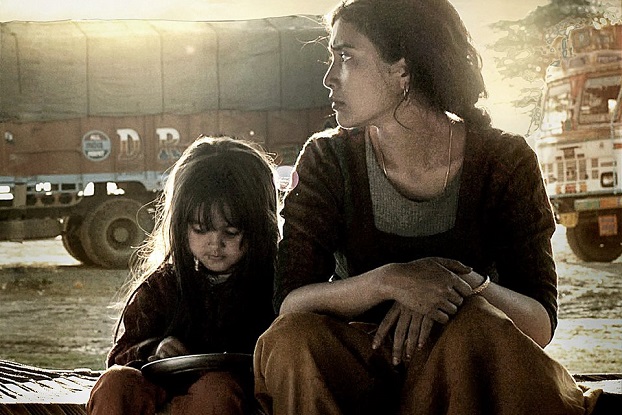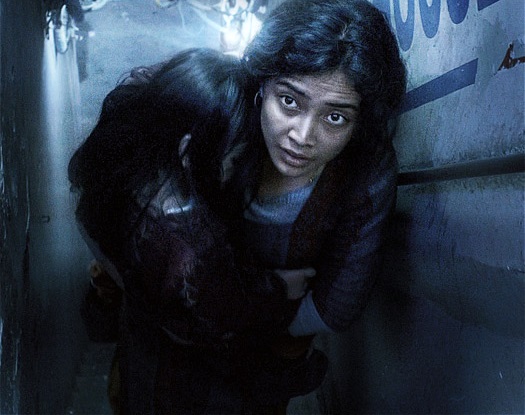
Imagine you’re on a dangerous journey with no guide, and on the way you encounter someone who you don’t know at all, but who clearly knows better than you. Would you want that person’s help? Or would you decide that it’s safer to trust no one?
It’s something that Kamla (Geetanjali Thapa), the protagonist in Geetu Mohandas’s debut film Liar’s Dice, can never quite make up her mind about. Liar’s Dice screened at Sundance earlier this year. I saw it at the Indian Film Festival of Los Angeles, and it will screen at the New York Indian Film Festival this week on Thursday, May 8.
Ignoring the protests of others, Kamla leaves her village in Himachal Pradesh to go looking for her husband, a day laborer in Delhi [pullquote]Kamla leaves her village in Himachal Pradesh to go looking for her husband, a day laborer in Delhi who she hasn’t heard from in five months.[/pullquote]who she hasn’t heard from in five months, her tiny daughter and pet goat in tow. When darkness falls on their snow-caked path, their movement becomes more urgent. A couple truck drivers see Kamla walking with no man in sight, and take the opportunity to harass her. Nawazuddin (Nawazuddin Sidiqqi), who had climbed unseen into the back of their truck, witnesses Kamla’s distress and intervenes. The drivers forget Kamla and attack Nawazuddin instead. Briefly, Kamla is safe, but she doesn’t know who her mysterious helper is, or what his motives are.

The Himalayas in this story are not majestic but forbidding and unreadable. Kamla stares blankly into them as she waits — for a bus, or a jeep, or some sign that her struggle will be worth it. The pale mountainous faces of rock and snow tell her nothing about how long the wait will be, or where her husband is. As they descend together through this lonesome landscape, Kamla and Nawazuddin slowly inch closer to one another. Nawazuddin has continued to follow Kamla, keeping his distance, since meeting her. His face remains inscrutable as he watches her haggard beauty from the opposite corner of a bus.
They begin to do each other little favors. She poses as his wife to help him avoid detection from the police. He stops some thieves from taking her goat. She tells her daughter, Manya (Manya Gupta), to bring him a roti. It’s hard to know exactly why they do these things for each other. Attraction? Pity? Or something more self-serving? The wall of suspicion between them never disappears.
Their relationship changes when Kamla directly asks Nawazuddin for help. She tells him she needs him to get to an address she has hidden in her bag. They haggle and agree on a price of 500 rupees, but he wants 200 in advance. “What if you cheat me?” he tells her. “You could cheat me,” she says. “Fine, then go with the person you trust.” Of course there is no one else. The power balance has been established.
Now that Kamla has placed her family’s fate in Nawazuddin’s hands, his unknown identity becomes more sinister. As the landscape around them changes, flattening, and becoming more urban, so does Nawazuddin’s façade. He shaves, switches headgear, switches clothing, but his expression tells as little as ever. Meanwhile, Kamla’s face remains a mask of suspicion and concern as she continues to watch and wait, periodically calling her husband’s number on her cellphone and listening to it ring. In Shimla, Nawazuddin leaves Kamla’s side and heads down to a fairground, where he leads a dice game. His normally expressionless face breaks out into a conman’s grimace as he delivers his spiel.
[pullquote align = “right”]This film is dedicated to migrant workers, whose frequent disappearances are only a statistic to many people.[/pullquote]In an email, Mohandas told me this film is dedicated to migrant workers, whose frequent disappearances are only a statistic to many people. With Liar’s Dice, she wanted to show the real human consequences of such disappearances. She successfully pulls her audience into the excruciating rhythm of Kamla’s high-stakes venture.
Sidiqqi lives up to his usual standards — his generally restrained performance makes the brief glimmers of Nawazuddin’s true character all the more chilling. Thapa continues to strengthen the reputation she has begun to build with I.D. and Monsoon Shootout.

Between I.D. and Liar’s Dice, Thapa is becoming the face of the Indian migrant worker’s struggle, in Indian independent cinema. In both films, her vulnerable look reflects the tragedy around her, although in I.D., she plays the city slicker who’s first exposure to poverty unnerves her. Her gentle desperation in Liar’s Dice is compelling, but I would have liked to know more about Kamla, her interests, and her relationship with her missing husband.
Perhaps Mohandas is trying to show that even a personality can be a liability in such forbidding territory.
The New York Indian Film Festival screens Liar’s Dice on Thursday, May 8. See the festival’s 2014 schedule for details.
Hannah Harris Green is a writer in Los Angeles whose work has appeared in American, Indian and Pakistani publications. You can follow her on twitter: @write_noise.













1 thought on “Review: Geetu Mohandas’s Debut Film ‘Liar’s Dice’ Dedicated to Migrant Workers”
Comments are closed.